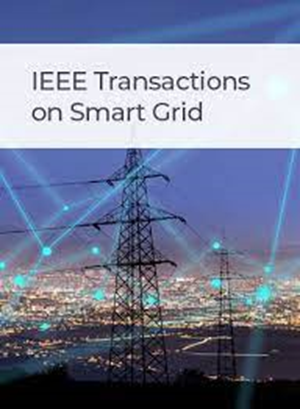检测针对智能电网中静态可变补偿器的恶意命令注入攻击
IF 8.6
1区 工程技术
Q1 ENGINEERING, ELECTRICAL & ELECTRONIC
引用次数: 0
摘要
在智能电网中,电压控制和无功功率控制对电网的安全可靠运行至关重要。静止可变补偿器(SVC)被广泛应用于输电系统中,通过能源管理系统的集中控制或本地闭环控制系统实现这些控制。在智能电网中,控制 SVC 的指令通道很容易受到网络攻击。本文详细研究了向 SVC 注入恶意命令的攻击场景。本文建立了两种控制方法的攻击模型。根据这些攻击模型,提出了两种检测算法。这些算法背后的原理是,即使对手可以操纵与 SVC 相关的命令和测量值,也几乎不可能隐藏对系统中其他状态变量和测量值的影响。这些算法是利用电气量以数学方式开发的,因此这些方案与所使用的基础信息和通信技术(ICT)无关。算法开发过程中所做选择的合理性已得到正式证明。最后,正式提出了两种算法,与迭代算法和多阶段算法相比,这两种算法易于实施,计算密集度较低。然后,在 IEEE 118 总线系统的各种测试案例中对这些算法进行了测试,并发现它们是有效的。本文章由计算机程序翻译,如有差异,请以英文原文为准。
Detection of Malicious Command Injection Attacks Against Static Var Compensators in Smart Grids
In a smart grid, voltage control and reactive power control are crucial to its safe and reliable operation. Static Var compensators (SVCs) are widely used to achieve these controls in a transmission system, either through centralized control by Energy Management Systems or through local closed loop control systems. In smart grids, the command channels to control SVCs are vulnerable to cyber attacks. In this paper, attack scenarios involving injection of malicious commands to SVCs are studied in detail. Attack models are established for both methods of control. Based on these attack models, two detection algorithms are proposed. The principle behind these algorithms involves the notion that even though an adversary can manipulate the commands and measurements related to SVCs, it is nearly impossible to hide the effect on other state variables and measurements in the system. The algorithms are developed mathematically using electrical quantities, making these schemes independent of the underlying Information and Communication Technologies (ICT) used. The rationale behind the choices made during the development of the algorithms are proven formally. Finally, two algorithms are formally proposed, which are easy to implement and computationally less intensive, when compared to iterative and multi-stage algorithms. These algorithms are then tested on various test-cases on the IEEE 118-bus system and found to be effective.
求助全文
通过发布文献求助,成功后即可免费获取论文全文。
去求助
来源期刊

IEEE Transactions on Smart Grid
ENGINEERING, ELECTRICAL & ELECTRONIC-
CiteScore
22.10
自引率
9.40%
发文量
526
审稿时长
6 months
期刊介绍:
The IEEE Transactions on Smart Grid is a multidisciplinary journal that focuses on research and development in the field of smart grid technology. It covers various aspects of the smart grid, including energy networks, prosumers (consumers who also produce energy), electric transportation, distributed energy resources, and communications. The journal also addresses the integration of microgrids and active distribution networks with transmission systems. It publishes original research on smart grid theories and principles, including technologies and systems for demand response, Advance Metering Infrastructure, cyber-physical systems, multi-energy systems, transactive energy, data analytics, and electric vehicle integration. Additionally, the journal considers surveys of existing work on the smart grid that propose new perspectives on the history and future of intelligent and active grids.
 求助内容:
求助内容: 应助结果提醒方式:
应助结果提醒方式:


